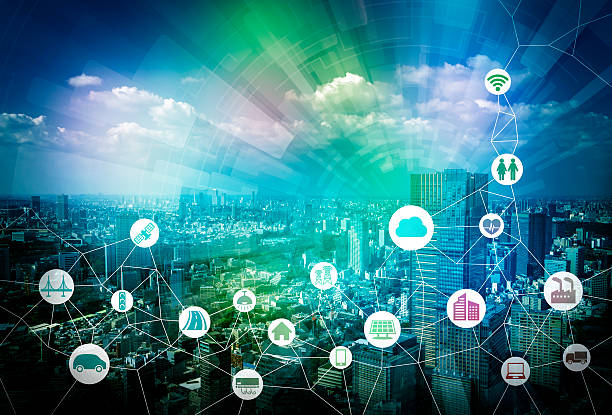Smart cities represent a revolutionary shift in urban planning and development, leveraging technology to enhance the quality of life for residents, improve sustainability, and optimize city operations. By integrating advanced technologies such as the Internet of Things (IoT), artificial intelligence (AI), and data analytics, smart cities aim to create more efficient, responsive, and resilient urban environments. This article explores the core concepts of smart cities, their benefits and challenges, and the future outlook of urban development.

Understanding Smart Cities
Smart cities utilize digital technology to improve various aspects of urban living, including infrastructure, transportation, energy management, and public services. The primary goal of a smart city is to enhance the efficiency and effectiveness of city operations while providing a better quality of life for its inhabitants. Key components of smart cities include:
- Internet of Things (IoT): IoT refers to the network of interconnected devices and sensors that collect and exchange data. In smart cities, IoT devices monitor and manage various systems, such as traffic signals, energy grids, and environmental sensors, to provide real-time insights and improve decision-making.
- Data Analytics: Data analytics involves the collection, analysis, and interpretation of large volumes of data to inform decision-making and optimize operations. Smart cities use data analytics to understand patterns, predict trends, and enhance city management.
- Artificial Intelligence (AI): AI technologies, including machine learning and predictive analytics, are used to analyze data, automate processes, and make intelligent decisions. AI helps in optimizing traffic flow, managing energy consumption, and improving public safety.
- Communication Networks: High-speed communication networks, such as 5G, are essential for transmitting data between IoT devices, sensors, and central management systems. These networks enable real-time data exchange and ensure seamless connectivity across the city.
- Sustainable Technologies: Smart cities prioritize sustainability by incorporating technologies that reduce energy consumption, minimize waste, and lower carbon emissions. This includes renewable energy sources, smart grids, and green building practices.
Benefits of Smart Cities
- Enhanced Efficiency:
- Optimized Resource Management: Smart cities use technology to optimize the management of resources such as water, energy, and waste. Smart grids, for example, enhance energy distribution and reduce outages, while smart meters provide real-time consumption data for better management.
- Improved Traffic Management: Intelligent traffic systems use data from sensors and cameras to manage traffic flow, reduce congestion, and minimize travel time. Real-time traffic information helps drivers avoid delays and optimize routes.
- Increased Sustainability:
- Energy Efficiency: Smart cities integrate energy-efficient technologies and renewable energy sources to reduce overall energy consumption and greenhouse gas emissions. Smart lighting systems adjust brightness based on natural light and occupancy, while solar panels and wind turbines provide clean energy.
- Waste Reduction: Smart waste management systems use sensors to monitor waste levels in bins and optimize collection routes. This reduces the frequency of waste collection, lowers fuel consumption, and minimizes environmental impact.
- Improved Quality of Life:
- Enhanced Public Services: Smart cities use technology to improve public services such as healthcare, education, and emergency response. Telemedicine services, online education platforms, and real-time emergency alerts contribute to better access and efficiency.
- Greater Safety: Advanced surveillance systems and AI-driven analytics enhance public safety by monitoring public spaces, detecting potential threats, and responding quickly to incidents. Smart city technologies also improve disaster preparedness and response.

- Economic Growth:
- Attracting Investment: The implementation of smart technologies and infrastructure attracts businesses and investors interested in innovative and sustainable urban environments. This leads to economic growth, job creation, and increased competitiveness.
- Innovation Hubs: Smart cities foster innovation by providing a conducive environment for technology startups and research institutions. Collaboration between public and private sectors drives the development of new solutions and technologies.
- Enhanced Connectivity:
- Seamless Integration: High-speed communication networks and IoT devices provide seamless connectivity across the city, enabling efficient data exchange and integration of various systems. This enhances the overall functionality and coordination of city services.
Challenges and Considerations
- Data Privacy and Security:
- Protecting Personal Data: The collection and analysis of vast amounts of data in smart cities raise concerns about privacy and data security. Ensuring robust data protection measures and addressing potential breaches are critical to maintaining public trust.
- Cybersecurity Risks: Smart city infrastructure is vulnerable to cyberattacks and hacking attempts. Implementing strong cybersecurity protocols and continuously monitoring for threats are essential to safeguarding city systems and data.
- Technological Integration:
- System Compatibility: Integrating new technologies with existing infrastructure can be challenging due to compatibility issues and the need for system upgrades. Ensuring interoperability and seamless integration is crucial for the success of smart city initiatives.
- Infrastructure Costs: The implementation of smart technologies requires significant investment in infrastructure, including sensors, communication networks, and data management systems. Balancing costs with benefits is important for sustainable development.
- Equity and Accessibility:
- Digital Divide: Smart city technologies must be accessible to all residents, including those in underserved or marginalized communities. Addressing the digital divide and ensuring equitable access to technology are important for inclusivity.
- Public Engagement: Involving residents in the planning and implementation of smart city projects helps address community needs and preferences. Public engagement and feedback contribute to the success and acceptance of smart city initiatives.
- Regulatory and Policy Issues:
- Developing Standards: Establishing standards and regulations for smart city technologies is essential to ensure safety, interoperability, and data privacy. Collaboration between government agencies, industry stakeholders, and regulatory bodies is needed to develop comprehensive policies.
- Adapting to Change: Rapid technological advancements require adaptive regulatory frameworks that can keep pace with innovation. Policymakers must address emerging issues and adapt regulations to accommodate new technologies and solutions.
- Sustainability and Environmental Impact:
- Balancing Growth: While smart cities prioritize sustainability, the development and deployment of technologies can have environmental impacts. Balancing technological growth with environmental conservation is important for achieving long-term sustainability.

Future Outlook
- Integration of Advanced Technologies: The future of smart cities will involve the integration of advanced technologies such as 6G networks, advanced AI, and quantum computing. These innovations will enhance the capabilities of smart city systems and provide new opportunities for urban development.
- Focus on Resilience: Building resilience to climate change and natural disasters will be a key focus for smart cities. Technologies that enhance disaster response, resource management, and infrastructure durability will play a crucial role in creating resilient urban environments.
- Citizen-Centric Solutions: Future smart cities will prioritize citizen engagement and user-centric solutions. Technologies and services will be designed to meet the needs and preferences of residents, enhancing their overall experience and quality of life.
- Global Collaboration: The development of smart cities will involve global collaboration and knowledge sharing. International partnerships and exchanges will drive innovation, promote best practices, and address common challenges faced by cities worldwide.
- Ethical and Inclusive Development: Ensuring that smart city initiatives are developed ethically and inclusively will be critical. Addressing issues of equity, privacy, and accessibility will ensure that the benefits of smart cities are shared by all residents.
Conclusion
Smart cities represent a transformative approach to urban development, leveraging technology to create more efficient, sustainable, and livable environments. While challenges such as data privacy, technological integration, and equity need to be addressed, the benefits of smart cities—including enhanced efficiency, improved quality of life, and economic growth—offer significant potential. As technology continues to evolve and cities embrace innovative solutions, smart cities will play a pivotal role in shaping the future of urban living and creating resilient, connected communities.

